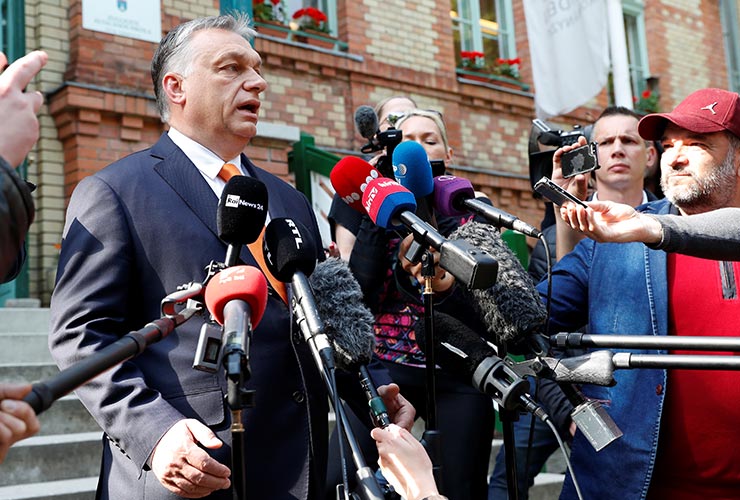Hungarian democracy is at a critical juncture. Early next week, MPs will vote on whether to approve a new draft law in response to the Covid-19 pandemic.
Though ostensibly aimed at tackling the Covid-19 pandemic, the legislation would also allow Prime Minister Viktor Orbán to extend the current state of emergency and rule by decree for an indefinite period. Opposition parties blocked the bill last Monday, but Orbán’s Fidesz party will hold a second vote on March 30 where it will face a lower threshold.
The draft law also foresees changing the criminal code to punish the spreading of “false” or “distorted” information deemed to undermine the authorities’ fight against the virus with fines and up to five years in prison. Journalists and media freedom advocates fear the measure could be used to silence what remains of the country’s independent press.
To address these concerns, IPI Deputy Director Scott Griffen today held a press briefing with Hungarian journalists Marton Gergely of HVG, one of Hungary’s leading economic and political weeklies, and Daniel Renyi, of the independent news website 444.hu.
Poor track record
Both journalists placed the planned legislation in the wider context of media freedom in Hungary in recent years. An IPI-led report published late last year described how the Fidesz party has systematically dismantled media independence, freedom and pluralism and divided the journalistic community in the country over the past 10 years, giving it a degree of media control unprecedented in an EU member state.
The threat of criminalizing journalism under the new law on “false information” would have the effect of putting critical and independent journalists under more pressure than ever before, Gergely explained.
“There was already immense pressure on independent media” he said. “Somehow the Hungarian government has found a way to increase that pressure.”
He said that the broad scope of the proposed bill and the and vague definition of “false information” made it difficult to foresee how exactly it would be used against the media. Gergely said he expected to measure to pass, at most with minor amendments.
Renyi added that the point of the bill may be less about targeting journalists directly than creating self-censorship and thereby indirectly increasing control over the flow of information.
“It’s a tool to scare the media and deter us and make us more cautious about writing difficult or challenging stories that may challenge the government’s response to the coronavirus”, he said.
He added: “I don’t think they [Fidesz] have a major plan right now or in the coming months to target journalists. This is about arming themselves for an attack for the future. It’s likely they’ll wait to see how things evolve.”
Wrestling back control
On a deeper level, Renyi added, the strength of the emergency measures was also a reaction against the lack of control over the fast-moving health crisis caused by COVID-19.
“It’s a control issue”, he said. “Last year Fidesz won a majority in parliament. In May this year the party is due to celebrate their 10-year anniversary in government. Before coronavirus, Orbán was in total control. This is an unprecedented challenge.”
Hungary has so far recorded over 300 infections from the new virus and at least ten deaths. With tensions and criticism of the government’s response rising, the government has begun ramping up its communications through pro-regime media, he added.
“Control over the communication means control over the narrative, which means control over the politics”, he said. “Right now, Fidesz is fearful of losing control over that narrative which they dominated for so long.”
The problem, he added, was that a lack of clear information over the virus from government was driving people to more critical media. “Even Fidesz voters are not reading the pro-government news”, he said.
As a result, over the past two weeks the Orbán government, aided by some pro-government media, has accused independent media outlets of spreading “fake news” for asking questions about the government’s preparedness and handling of the crisis.
If the draft law is passed on Monday, both journalists said this pressure would only grow further.
Read IPI other actions on Hungary’s emergency COVID-19 legislation:
• Hungary seeks power to jail journalists for ‘false’ COVID-19 coverage
• Europe’s leaders must protect free flow of information to tackle COVID-19

This statement by IPI is part of the Media Freedom Rapid Response (MFRR), a Europe-wide mechanism which tracks, monitors and responds to violations of press and media freedom in EU Member States and Candidate Countries.
